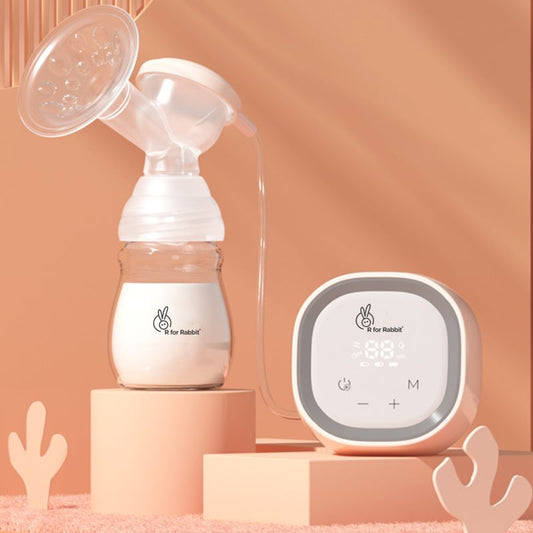Is My Baby Getting Sufficient Breast Milk? 8 Signs to Watch For

All parents want their children to grow completely healthy and strong. It is important to provide them with enough food and nutrition. So, as a mother, when you breastfeed as it is healthy and will help you in creating a strong bond with your baby, you may feel joyful and stressed at the same time. This scenario is common and you will wonder if your baby is getting enough breast milk.
So, new parents worry about their kids' diets. You have no idea how much milk your kid is getting during nursing. There are several techniques to determine if your child is eating enough.
You can also learn from your baby's feeding behavior. Rooting or sucking on fists and a satisfied expression after nursing suggest successful feedings. If your infant is alert, active, and fulfils developmental milestones, they may be well-nourished.
Recognising these indicators helps boost moms' breastfeeding confidence and belief in their ability to meet their baby's needs. So, the question remains: is my baby getting enough milk? Therefore, we will go over eight indicators that your kid is getting sufficient breast milk in this blog post.
8 Signs Baby is Getting Plenty of Breastmilk

Nursing is a natural way to bond with your baby and offer them energy. Women who breastfeed may worry about their child's milk consumption. Is my baby getting enough milk breastfeeding? However, many symptoms can confirm breastfeeding is going successfully.
In this detailed guide, we will discuss eight signs that your baby is flourishing on breast milk and offer nursing strategies.
1. Hearing Swallowing Sounds While Nursing
Breastfeeding audio signals help you comprehend your baby's eating patterns. Hearing your baby swallow means they are latching onto the breast and drawing milk. The rhythmic sound indicates that your kid is getting enough food. Swallowing sounds might be slight, especially if your kid is a good eater. Even a weak swallow indicates milk transfer.
Try breastfeeding in a quiet, distraction-free area to hear swallowing sounds. This lets you concentrate on feeding and notice your baby's signs. Experimental breastfeeding positions like the cradle hold and football hold can improve your baby's latch and feeding efficiency.
2. Seeing Milk Around Baby's Mouth After Feeding
How do I know my baby is getting enough breast milk? Checking your baby's mouth after feedings can establish proper milk consumption. Milk residue on your baby's lips and chin indicates effective breastfeeding. This shows that your infant vigorously breastfed and stimulated breast milk supply.
Lack of milk around your baby's lips does not mean insufficient feeding. Some babies latch better and spill less milk. If you routinely detect a lack of milk residue after feeds and are concerned about your baby's milk intake, see a lactation consultant or healthcare professional for personalised advice.
3. Counting Heavy Wet Diapers Per Day
Your baby's nappy output can indicate hydration and milk intake. Wet diapers indicate optimal fluid intake and nursing. Your newborn should have six to eight heavy wet diapers per day in the first several weeks.
It is crucial to distinguish wet from damp diapers. Your infant has discharged enough urine if a heavy wet nappy feels saturated. A diaper log can properly track your baby's diaper output, revealing their nutrition condition.
4. Noticing Weight Gain Consistently at Appointments
Regular paediatrician visits allow you to track your baby's growth. Gaining weight indicates proper milk consumption and health. Weight changes are usual in the first few months as babies adjust to feeding patterns and growth spurts.
Your doctor will graph your baby's weight on growth charts. Even if it changes somewhat between visits, consistent weight gain indicates that your baby is healthy and receiving enough breast milk. Insufficient weight gain or other feeding issues? Your healthcare provider can help.
5. Watching for Bright, Alert or Wakeful Behavior
Your baby's behaviour reveals their happiness and well-being. It is important to remember that newborns' temperaments and energy levels affect their behaviour.
However, continuous wakefulness and engagement after feeds indicate that your baby is happy and getting enough breast milk. Use your parenting instincts to assess your baby's feeding contentment.
Also Read: Why Breastfeeding Is Important For Your Newborn?
6. Monitoring for Sufficient Dirty Diapers
Bowel motions and moist diapers indicate your baby's digestive and nutritional health. Regular, soft, mustard-coloured faeces are typical of breastfed babies. Most breastfed newborns have three to four bowel movements per day in the first few weeks.
As your baby's digestive tract matures, bowel motions may change in consistency and regularity. Exclusive breastfeeding may reduce bowel motions compared to formula-fed infants. Discuss your baby's stool patterns with your doctor if you detect a dramatic decrease in bowel motions.
7. Expecting Natural Growth Patterns
Trusting babies' natural growth is crucial. Infancy growth spurts—accompanied by fussiness and increased feeding frequency - are normal. At certain times, your baby may nurse more to meet their nutritional demands.
Recognising a growth spurt and accepting your baby's increased eating cues requires patience and reassurance. Allowing your baby to eat on demand during these stages helps them grow and get enough nutrition. Faith in your baby's growth patterns can reduce worry and improve nursing.
8. Ensuring the Mother Does Not Have Ongoing Pain
While breastfeeding may cause some discomfort while you and your baby adjust, chronic pain may signal underlying concerns. Nipple discomfort, damaged nipples, and engorgement might impair milk transfer and feeding.
Consult a lactation consultant or doctor if breastfeeding causes pain. They can help with latching, breastfeeding techniques, and discomfort management. Keep your comfort and well-being in mind when nursing.
Breastfeeding links mother and child and is pleasurable. By learning the symptoms of appropriate milk intake, you can nurse with confidence and peace of mind. From swallowing sounds to nappy output and growth trends, each piece of evidence confirms your baby is getting enough breast milk. Breastfeeding is an ongoing process, so it is common to have obstacles.
Trust in your parenting instincts, seek support when required, and enjoy feeding and bonding with your kid. A successful nursing connection can benefit you and your child for years with patience, perseverance, and support.
What To Do if You Suspect Low Supply?
Breastfeeding is lovely and natural, benefiting both mother and baby. However, poor milk supply can be distressing for some women. You must act if you detect a reduced breast milk supply. Here are several ways to handle a poor milk supply:
-
Consult Your Pediatrician
Your paediatrician is the first stop if you suspect decreasing breast milk production. Your paediatrician can assess your baby's weight gain, eating patterns, and health to estimate milk supply. They can also eliminate medical causes of low supply.
-
Implement Lactation Support Strategies:
Various lactation support strategies boost milk supply:
-
Breastfeeding frequently:
Nursing boosts milk production owing to supply and demand. Every 2-3 hours during the day and once or twice at night, breastfeed your baby.
- Make sure latch:
Effective breastfeeding requires a healthy latch. To promote milk supply and avoid nipple pain, make sure your baby latches properly.
-
Pump between feeds:
Using a breast pump between feedings increases milk production. Pump for 10-15 minutes after nursing to stimulate milk production.
-
Direct skin contact:
Intimate contact with your infant might boost milk production hormones. As much as possible, cuddle your baby.
-
Maintain hydration and nutrition:
Drinking water and eating a balanced, nutritious diet supports milk production. Muesli, fenugreek and fennel may increase milk production.
-
Consider galactagogues:
Galactagogues boost milk production. You can discuss with your doctor about herbal supplements or domperidone to increase milk production.
-
Get help:
For advice and assistance, consult a lactation consultant or nursing support group. They can help you overcome breastfeeding issues with personalised guidance and assistance.
-
Document and Monitor Closely
Keep track of your baby's feeding patterns, diaper output, and weight gain to evaluate your milk supply efforts. Documenting this information helps you track progress and identify adjustments and improvements.
Each mother-baby pair is unique, so what works could not work for another. Be persistent and ask for help to increase your milk production. With the correct support and methods, many moms may overcome poor milk supply and breastfeed for as long as they want.

Also Read: How To Increase Breast Milk Naturally at Home
Key Takeaways
So, we discussed here queries like is my baby getting enough milk and the related eight signs. We also explored if your breastfed infant is getting proper nutrition to grow or not. For this you can check aspects such as average weight gain of the baby, contentment after feeds, at least six wet diapers a day, breast fullness softening and flattening after nursing.
As a mother you must select quality nursing care products from trusted brands like R for Rabbit, which is known for its excellent and safe infant care products. Our nursing care products at R for Rabbit will address your challenges as a mother.
However, if you see any abnormalities or have nutrition or health concerns for your infant, get expert advice from a professional. A lactation consultant or paediatrician can offer personalised advice to protect your baby's health and boost their overall growth.










